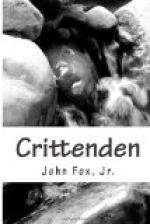Pull him t’roo! (grunt)
Yes,
man.
Pull him t’roo—huh!
Saw him to de heart.
Gwine to have Christmas.
Yes,
man!
Gwine to have Christmas.
Yes,
man!
Gwine to have Christmas
Long
as he can bu’n.
Burn long, log!
Yes,
log!
Burn long, log!
Yes,
log,
Heah me, log, burn long!
Gib dis nigger Christmas.
Yes,
Lawd, long Christmas!
Gib dis nigger Christmas.
O
log, burn long!
And the saw sang with them in perfect time, spitting out the black, moist dust joyously—sang with them and without a breath for rest; for as two pair of arms tired, another fresh pair of sinewy hands grasped the handles. In an hour the whistle of the saw began to rise in key higher and higher, and as the men slowed up carefully, it gave a little high squeak of triumph, and with a “kerchunk” dropped to the ground. With more cries and laughter, two men rushed for fence-rails to be used as levers.
There was a chorus now:
Soak him in de water,
Up,
now!
Soak him in de water,
Up,
now!
O Lawd, soak long!
There was a tightening of big, black biceps, a swelling of powerful thighs, a straightening of mighty backs; the severed heart creaked and groaned, rose slightly, turned and rolled with a great splash into the black, winter water. Another delighted chorus:
“Dyar now!”
“Hol’ on,” said Bob; and he drove a spike into the end of the log, tied one end of a rope to the spike, and the other to a pliant young hickory, talking meanwhile:
“Gwine to rain, an’ maybe ole Mister Log try to slip away like a thief in de dark. Don’t git away from Bob; no suh. You be heah now Christmas eve—sho’!”
“Gord!” said a little negro with bandy legs. “Soak dat log till Christmas an’ I reckon he’ll burn mo’n two weeks.”
God was good that Christmas—good to the nation, for He brought to it victory and peace, and made it one and indivisible in feeling, as it already was in fact; good to the State, for it had sprung loyally to the defence of the country, and had won all the honour that was in the effort to be won, and man nor soldier can do more; good to the mother, for the whole land rang with praises of her sons, and her own people swore that to one should be given once more the seat of his fathers in the capitol; but best to her when the bishop came to ordain, and, on his knees at the chancel and waiting for the good old man’s hands, was the best beloved of her children and her first-born—Clay Crittenden. To her a divine purpose seemed apparent, to bring her back the best of the old past and all she prayed for the future.




